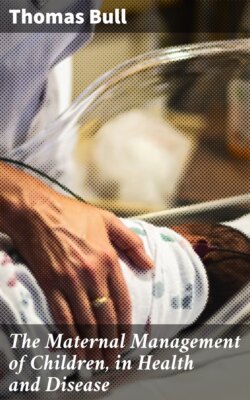Читать книгу The Maternal Management of Children, in Health and Disease - Thomas Bull - Страница 23
На сайте Литреса книга снята с продажи.
THE KIND OF ARTIFICIAL FOOD AFTER THE SIXTH MONTH, TO THE COMPLETION OF FIRST DENTITION.
ОглавлениеTable of Contents
As soon as the child has got any teeth—and about this period one or two will make their appearance—solid farinaceous matter boiled in water, beaten through a sieve, and mixed with a small quantity of milk, may be employed. Or tops and bottoms, steeped in hot water, with the addition of fresh milk and loaf sugar to sweeten. And the child may now, for the first time, be fed with a spoon.
When one or two of the large grinding teeth have appeared, the same food may be continued, but need not be passed through a sieve. Beef tea and chicken broth may occasionally be added; and, as an introduction to the use of a more completely animal diet, a portion, now and then, of a soft boiled egg; by and by a small bread pudding, made with one egg in it, may be taken as the dinner meal.
Nothing is more common than for parents during this period to give their children animal food. This is a great error. "To feed an infant with animal food before it has teeth proper for masticating it, shows a total disregard to the plain indications of nature, in withholding such teeth till the system requires their assistance to masticate solid food. And the method of grating and pounding meat, as a substitute for chewing, may be well suited to the toothless octogenarian, whose stomach is capable of digesting it; but the stomach of a young child is not adapted to the digestion of such food, and will be disordered by it."[FN#10]
[FN#10] Sir James Clarke on Consumption.
"If the principles already laid down be true, it cannot reasonably be maintained that a child's mouth without teeth, and that of an adult, furnished with the teeth of carnivorous and graminivorous animals, are designed by the Creator for the same sort of food. If the mastication of solid food, whether animal or vegetable, and a due admixture of saliva, be necessary for digestion, then solid food cannot be proper, when there is no power of mastication. If it is swallowed in large masses it cannot be masticated at all, and will have but a small chance of being digested; and in an undigested state it will prove injurious to the stomach and to the other organs concerned in digestion, by forming unnatural compounds. The practice of giving solid food to a toothless child, is not less absurd, than to expect corn to be ground where there is no apparatus for grinding it. That which would be considered as an evidence of idiotism or insanity in the last instance, is defended and practised in the former. If, on the other hand, to obviate this evil, the solid matter, whether animal or vegetable, be previously broken into small masses, the infant will instantly swallow it, but it will be unmixed with saliva. Yet in every day's observation it will be seen, that children are so fed in their most tender age; and it is not wonderful that present evils are by this means produced, and the foundation laid for future disease."[FN#11]
[FN#11] Dr. John Clarke's Commentaries.
The diet pointed out, then, is to be continued until the second year. Great care, however, is necessary in its management; for this period of infancy is ushered in by the process of teething, which is commonly connected with more or less of disorder of the system. Any error, therefore, in diet or regimen is now to be most carefully avoided. 'Tis true that the infant, who is of a sound and healthy constitution, in whom, therefore, the powers of life are energetic, and who up to this time has been nursed upon the breast of its parent, and now commences an artificial diet for the first time, disorder is scarcely perceptible, unless from the operation of very efficient causes. Not so, however, with the child who from the first hour of its birth has been nourished upon artificial food. Teething under such circumstances is always attended with more or less of disturbance of the frame, and disease of the most dangerous character but too frequently ensues. It is at this age, too, that all infectious and eruptive fevers are most prevalent; worms often begin to form, and diarrhoea, thrush, rickets, cutaneous eruptions, etc. manifest themselves, and the foundation of strumous disease is originated or developed. A judicious management of diet will prevent some of these complaints, and mitigate the violence of others when they occur.
